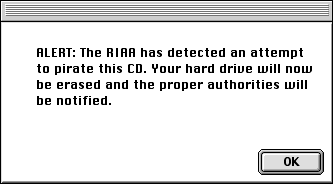Beyond the Barline
Record Execs Ate My Hard Drive!
I almost didn’t make it this month. Late March was busier then usual, what with grades at the University of Oregon due the Monday after Finals Week (due to the short break). In addition, Holy Week fell during Spring Break this year, so, between the various services at my church, I didn’t get much of a break at all. Still, I had allotted plenty of time to get my column done, but I hadn’t accounted for one thing…
The possibility that record execs would eat my hard drive.
I’ll start from the beginning. I came into a little spare cash recently, and decided to splurge on a few CDs. Two were classical, and the third was by a popular alternative rock band. Following Steve Jobs’ recent invitation to “Rip, Mix, Burn” I promptly opened iTunes to encode them to my hard drive. The two classical CDs gave me no problem, but when I loaded the aforementioned rock CD and selected Convert to MP3 in iTunes, the following warning appeared on my screen:

AAAAAAAAAA!!!!!
What could I do? My only option was “OK.” I tried clicking on the desktop, force quitting, and rebooting, but nothing worked. Before I finally hit return, and said goodbye to my hard drive, I could hear it spinning futilely in the background. It seemed to be saying “Save me, please,” but there was nothing I could do.
At first I was angry. It took a whole day to get everything reinstalled the way I wanted it. (I keep my personal files on another disk, thankfully, so nothing important was lost.) This set me way back on getting my column written, even farther back than I already was.
I’m not angry anymore, though. Why? Because of something I read a few days later in the local paper. The Sony Disc Manufacturing Plant is in nearby Springfield, and over the last few months, they’ve had to lay off hundreds of workers. The signs were clear to all who would dare look. CD piracy had cost those poor people their jobs. Well, some of those workers have since been recalled. I now know the reason why. It’s because of the brave executives of the RIAA, eating hard drives across America, including my own.
So in retrospect, the data on my hard drive was a small price to pay to give hundreds of local workers their job security back. I now see the error of my ways, and pledge to never again pirate any of my own CDs. And until the plague of music piracy is lifted—until the day that talented artists can once again make pennies on the dollar, and consumers can once again spend $18.99 for a favorite song on a CD filled with other tracks they’ll play only once—until that great day happens, I say to the RIAA, in the words of the venerable Crime Dog, “take a bite out of crime.” And while they’re at it, I can think of something else they can “bite” as well.
I love April…ha, ha, April Fool!
But Seriously…
Some good news last month: Steinberg announced the upcoming release of Cuebase SX, a Mac OS X version of their flagship sequencing and hard disk recording application. The software is scheduled for “the end of Q2 2002,” which I think translates to “summer.” MSRP is $799, with update pricing for owners of VST/32 ($149), VST Score ($199), and VST ($299). I’m still debating between Cuebase and Logic for my next sequencer, and OS X compatibility is a big plus, even if I won’t be upgrading for awhile. I’m still waiting on a definite release date for Emagic’s long-awaited OS X version of Logic.
Elsewhere in the news: The Internet Streaming Media Alliance (ISMA) has endorsed a licensing plan for the MPEG-4 Advanced Audio Coding (AAC) compression scheme. If you caught Steve Jobs’ appearance at this year Quick Time Live conference, or the subsequent coverage, you’ll know that Apple has incorporated MPEG-4 video compression into QuickTime 6, but is holding back the release until MPEG LA reconsiders their licensing terms. Hopefully, the endorsement of AAC will encourage MPEG LA to drop the per-minute rate on users that they originally proposed for MPEG-4 Video.
And finally: A court in the Netherlands recently overturned a ruling against a Swedish company called KaZaA. The company had developed a peer-to-peer file sharing service that the Dutch music rights organization Burma Stemra had said was being used to distribute copyrighted material illegally. The ruling was based on a 1984 U.S Supreme Court decision, which absolved VCR manufacturers of any liability due to copyright violations committed by the owners of said VCRs. Courts here in the US may now be more persuaded to see this ruling in a similar light, protecting not just peer-to-peer file sharing software, but also the manufacturers of CD burners, DVD burners, and similar technologies. So my hard drive is safe…for now.
Also in This Series
- Ready or Not! · November 2002
- The Other Petition · August 2002
- The Samples Have Been Changed to Protect the Innocent · May 2002
- Record Execs Ate My Hard Drive! · April 2002
- And the Award Goes to… · March 2002
- Expos, From a Distance · February 2002
- My Resolution · January 2002
- Too Much Hype · November 2001
- And They’re Off! · September 2001
- Complete Archive
Reader Comments (0)
Add A Comment